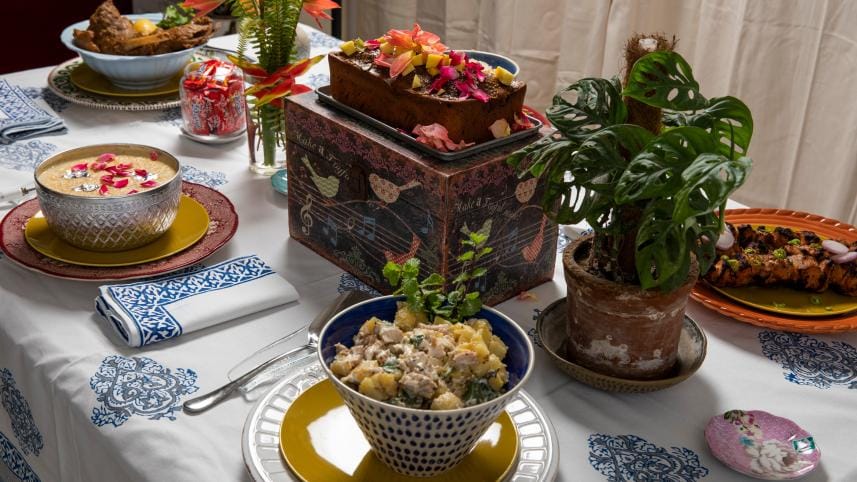An Eid lunch to remember

Kumkum Rahman grew up in Dhaka. As part of the generation of the '70s, she has recollections of a relatively quaint city, free from the hustle and bustle of the present day. Among her most treasured memories are those of Ramadan in the metropolis, but what remains etched in her heart is the joy of Eid in a bygone era.
"Eid morning had a magical feel to it," she said. "The day would begin with the smell of attar, and as my father and brothers would leave for the Eidgah early chanting the takbir, we would get dressed and eagerly set the table with an assortment of sweets and savoury dishes."
With a warm smile on her face, Rahman added, "There was something cosy about those moments — our little hands arranging my mother's finest crockery and the wild anticipation of our loved ones to return and begin the celebrations, because you see, in those days, Eid was not just a day of festivity; it was a grand reunion!"

During lunch, her entire family would gather in their Siddheshwari house. "Friends, the extended family — there was an open invitation for everyone, and people did come! At least fifty people would join my mother's Eid luncheon."
Her mother, back then the heart and the soul of the household, would wake up before dawn, grinding fresh spices and condiments, making dishes with perfection. The kitchen would come alive with the rich aroma of slow-cooked butter masala chicken and prawn bhuna, two of her signature dishes. But what Kumkum Rahman remembers even more than the delicacies is the warmth of the entire affair.
"It wasn't just about the food," she says. "It was the atmosphere — the older generation sitting together, exchanging stories, the middle-aged aunts and uncles catching up, and us — the cousins, the friends — running around. And then, there were the little ones, experiencing the magic of Eid day as we once did."
Perhaps, the feelings were similar even for all those who remember Eid of the eighties, even the nineties. Back then, Eid lunch was a tradition, a time when families—no matter how far apart — made it a point to come together.

In contrast to the nuclear family culture of today, extended families played a significant role, and homes were always open to guests. Today, Kumkum Rahman is a grandmother. Time has passed, but some traditions remain unchanged. Like her mother before her, she plays host to a grand Eid lunch.
Eid for her now begins a day in advance and chand raat — the evening before Eid — is still precious, as she carefully selects her table linens, polishes her finest cutlery, and plans her menu in meticulous detail.
Some of her children and grandchildren arrive for the Eid celebrations on Eid eve. Daughters and daughters-in-law arranging new clothes for the children, the faint scent of henna floats in the air, and the kitchen bustling with final preparations — all these signal that a special day is about to come.
"I still wake up early on Eid morning," Rahman shares. "Now, I prepare the firni and the payesh just the way mother used to. As the smell of saffron mixed with thickened milk fills the air, I instantly go back to my childhood."
By noon, the other guests start to arrive and the house fills with voices. Relatives dressed in their finest exchange Eid greetings and join in the conversations bringing with them the same excitement she once felt as a child.

Over the years, the grand Eid menu has changed significantly, but certain things never change — Eid lunch remains filled with excitement and an epicurean legacy.
"I still cook my mother's signature dishes, but to me, they do not taste the same. Although, my grandchildren simply love whatever I put on the table," she grins. "Us, now elders, sit together recalling stories of the past, while the younger generation captures the moment in photos and videos, sharing Eid on social media."
"The occasion has changed in many ways," Kumkum Rahman reflects. "Today, many of the faces that used to make regular appearances in the family lunch are no longer with us; a great many of them no longer live in the country. However, technology allows us to stay connected despite the long distance."
It still takes a lot of effort to bring together the entire family, but this is perhaps that magic of Eid that its essence remains the same. It is all about togetherness, about passing on love and traditions to the next generation.
 For all latest news, follow The Daily Star's Google News channel.
For all latest news, follow The Daily Star's Google News channel.
Comments